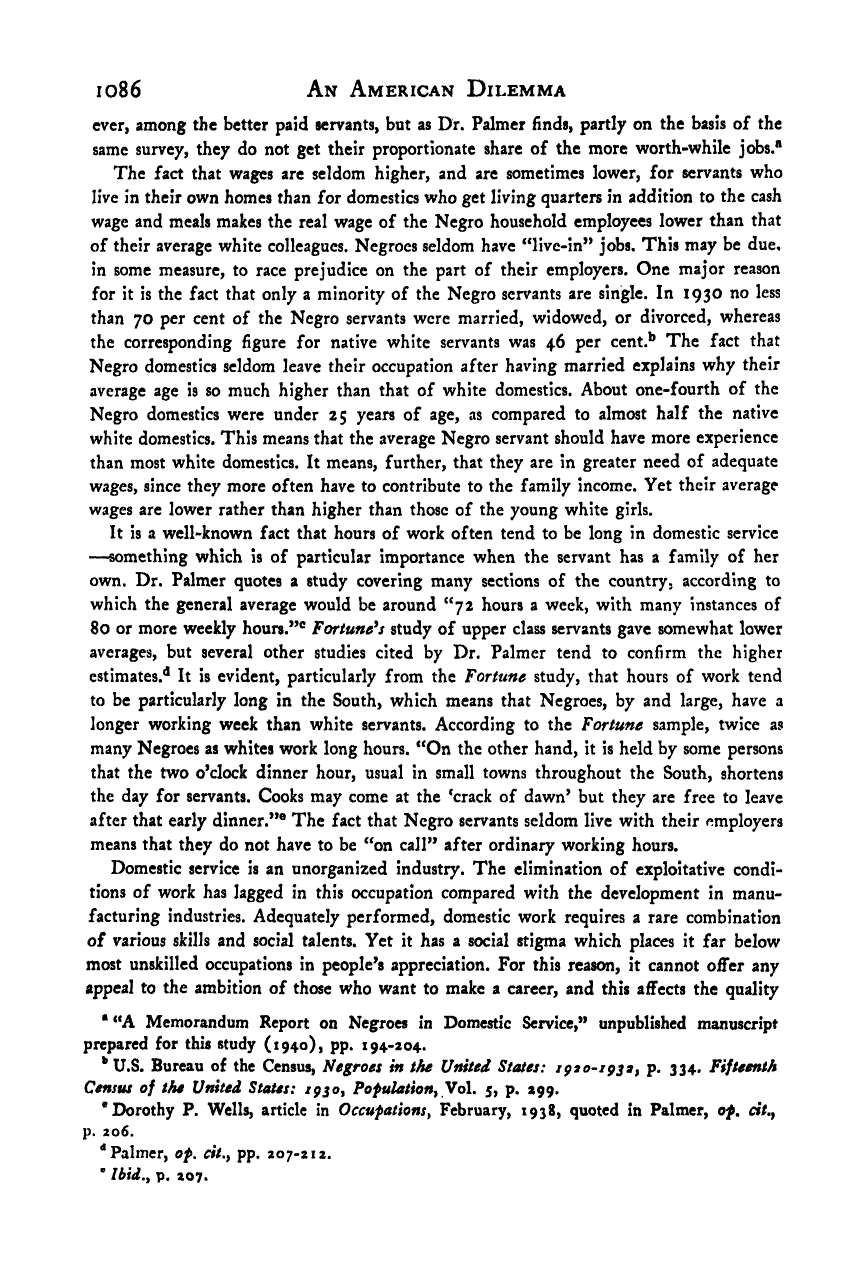Note: Gunnar Myrdal died in 1987, less than 70 years ago. Therefore, this work is protected by copyright, restricting your legal rights to reproduce it. However, you are welcome to view it on screen, as you do now. Read more about copyright.
Full resolution (TIFF) - On this page / på denna sida - Appendices - 6. Pre-War Conditions of the Negro Wage Earner in Selected Industries and Occupations - 2. Domestic Service

<< prev. page << föreg. sida << >> nästa sida >> next page >>
Below is the raw OCR text
from the above scanned image.
Do you see an error? Proofread the page now!
Här nedan syns maskintolkade texten från faksimilbilden ovan.
Ser du något fel? Korrekturläs sidan nu!
This page has never been proofread. / Denna sida har aldrig korrekturlästs.
io86 An American Dilemma
ever, among the better paid servants, but as Dr. Palmer finds, partly on the basis of the
same survey, they do not get their proportionate share of the more worth-while jobs.®
The fact that wages are seldom higher, and are sometimes lower, for servants who
live in their own homes than for domestics who get living quarters in addition to the cash
wage and meals makes the real wage of the Negro household employees lower than that
of their average white colleagues. Negroes seldom have “live-in” jobs. This may be due,
in some measure, to race prejudice on the part of their employers. One major reason
for it is the fact that only a minority of the Negro servants are single. In 1930 no less
than 70 per cent of the Negro servants were married, widowed, or divorced, whereas
the corresponding figure for native white servants was 46 per cent.** The fact that
Negro domestics seldom leave their occupation after having married explains why their
average age is so much higher than that of white domestics. About one-fourth of the
Negro domestics were under 25 years of age, as compared to almost half the native
white domestics. This means that the average Negro servant should have more experience
than most white domestics. It means, further, that they are in greater need of adequate
wages, since they more often have to contribute to the family income. Yet their average
wages are lower rather than higher than those of the young white girls.
It is a well-known fact that hours of work often tend to be long in domestic service
—something which is of particular importance when the servant has a family of her
own. Dr. Palmer quotes a study covering many sections of the country, according to
which the general average would be around “72 hours a week, with many instances of
80 or more weekly hours.”® Fortunc^s study of upper class servants gave somewhat lower
averages, but several other studies cited by Dr. Palmer tend to confirm the higher
estimates.** It is evident, particularly from the Fortune study, that hours of work tend
to be particularly long in the South, which means that Negroes, by and large, have a
longer working week than white servants. According to the Fortune sample, twice as
many Negroes as whites work long hours. “On the other hand, it is held by some persons
that the two o’clock dinner hour, usual in small towns throughout the South, shortens
the day for servants. Cooks may come at the ‘crack of dawn’ but they are free to leave
after that early dinner.”® The fact that Negro servants seldom live with their employers
means that they do not have to be “on call” after ordinary working hours.
Domestic service is an unorganized industry. The elimination of exploitative condi-
tions of work has lagged in this occupation compared with the development in manu-
facturing industries. Adequately performed, domestic work requires a rare combination
of various skills and social talents. Yet it has a social stigma which places it far below
most unskilled occupations in people’s appreciation. For this reason, it cannot offer any
appeal to the ambition of those who want to make a career, and this affects the quality
<< prev. page << föreg. sida << >> nästa sida >> next page >>